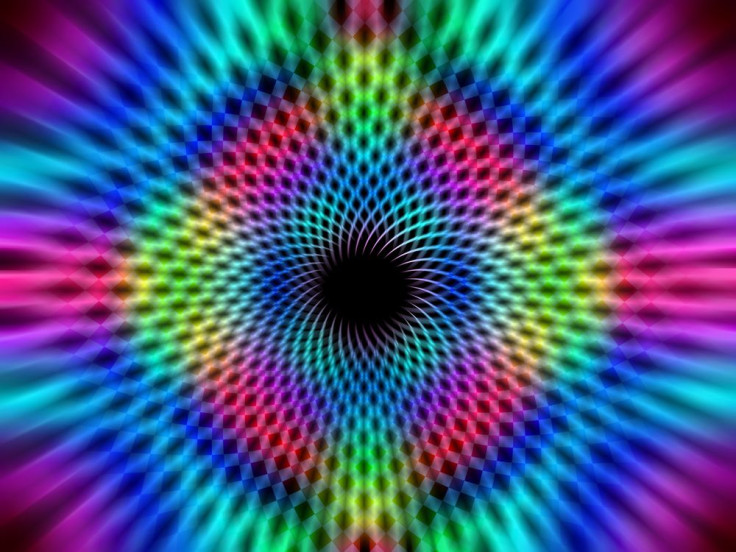LSD May Help Treat Anxiety For Terminal Patients: Are The Psychedelic's Benefits Worth Revisiting?

Marijuana, MDMA (ecstasy), magic mushrooms, and LSD (acid), are still considered Schedule I drugs under former President Richard Nixon’s Controlled Substances Act of 1970, labeling them as having a high potential for abuse and no accepted medical use. But every one of them is beginning to enjoy a renaissance, as health care providers begin to see their therapeutic effects. Most recently, a group of Swiss psychiatrists found that the psychedelic LSD (lysergic acid diethylamide) may ease the mental suffering of someone diagnosed with a life-threatening illness.
Their findings, published in The Journal of Nervous and Mental Disease, is the “first in more than 40 years to evaluate safety and efficacy of LSD as an adjunct to psychotherapy,” the researchers wrote. That is, 12 patients nearing the end of their life — most had terminal cancer — spoke with psychiatrist Dr. Peter Gasser while tripping on the psychedelic drug, which brings about various mental, physical, and sensory effects.
“I told them that each session would be right here, in a safe environment,” he told The New York Times. With the drug’s effects lasting up to 10 hours, each patient would sit on a couch in Gasser’s office for two or more sessions, while talking to Gasser or an assistant. “I said, ‘I can’t guarantee you won’t have intense distress, but I can tell you that if you do, it will pass.’”
Many of the patients experienced the feelings they had already been suffering through, albeit with more intensity. “I had what you call a mystical experience, I guess, lasting for some time, and the major part was pure distress at all these memories I had successfully forgotten for decades,” one patient, who only went by the name Peter, told the Times. “These painful feelings, regrets, this fear of death. I remember feeling very cold for a long time. I was shivering, even though I was sweating. It was a mental coldness, I think, a memory of neglect.”
After two sessions, anxiety measures among the eight participants who had gotten full doses of the drug (200 micrograms) decreased by about 20 percent. Conversely, patients who took an active placebo (20 micrograms) got worse. None of the patients experienced drug-related adverse events, like a panic reaction, suicidal crisis, or psychotic state.
Acid's History
LSD was first made in 1938 by the chemist Albert Hoffman. Its effects, however, weren’t discovered until 1943, when he accidentally absorbed some of it through his fingertips. He described the effect as a “not unpleasant intoxicated-like condition,” according to Popular Science. He subsequently tested the drug on animals, finding that it could have some benefits for psychotherapy. For one, it could help some psychiatrists understand what it’s like to be a mentally ill patient. He also saw it as a good way of freeing patients’ minds, and allowing them to speak more candidly.
The next 30 years saw multiple trials showing how LSD helped mental health — between 1950 and 1963, there were an estimated 40,000 people tested around the world. One study, from 1953, tested high doses of LSD on alcoholics, expecting them to be scared into sobriety. Instead, many of them reported mystical experiences that convinced them they had to stop. A 1964 paper published in the Canadian Medical Association Journal describes four years' worth of research, finding that about two-thirds of the 150 patients who underwent treatment with the drug were helped by it. These patients had a range of psychiatric disorders, from depression to schizophrenia to personality disorders.
While the use of LSD in psychotherapy is still far from available, and the results of Gasser’s study were too small to be conclusive, psychiatrists in the U.S. and abroad are starting to see that the drug may be worth revisiting — the patients certainly think so. “It’s a proof of concept,” Dr. Rick Doblin, executive director of the Multidisciplinary Association for Psychedelic Studies, told the Times. “It shows that this kind of trial can be done safely, and that it’s very much worth doing.
Source: Gasser P, Holstein D, Michel Y, et al. Safety and Efficacy of Lysergic Acid Diethylamide-Assisted Psychotherapy for Anxiety Associated With Life-threatening Diseases. The Journal of Nervous and Mental Disease. 2014.



























